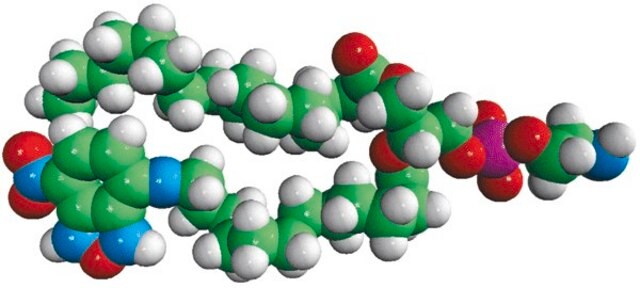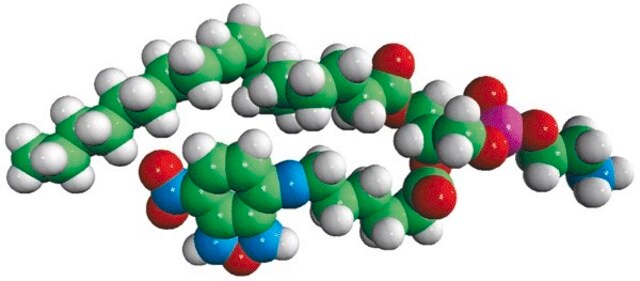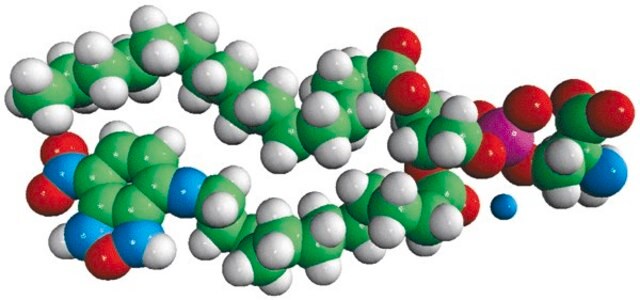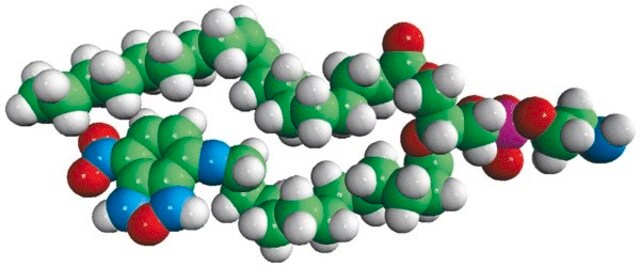810175P
Avanti
18:1-06:0 NBD PA
Avanti Research™ - A Croda Brand
Szinonimák:
1-oleoyl-2-{6-[(7-nitro-2-1,3-benzoxadiazol-4-yl)amino]hexanoyl}-sn-glycero-3-phosphate (ammonium salt)
Bejelentkezésa Szervezeti és Szerződéses árazás megtekintéséhez
Összes fotó(2)
About This Item
Tapasztalati képlet (Hill-képlet):
C33H56N5O11P
CAS-szám:
Molekulatömeg:
729.80
MDL-szám:
UNSPSC kód:
12352211
NACRES:
NA.25
Javasolt termékek
Teszt
>99% (TLC)
Forma
powder
kiszerelés
pkg of 5 × 2 mg (810175P-10mg)
gyártó/kereskedő neve
Avanti Research™ - A Croda Brand
kiszállítva
dry ice
tárolási hőmérséklet
−20°C
Általános leírás
Phosphatidic acid (PA) is an amphipathic lipid containing a polar head group and two long hydrophobic acyl chains. PA is an anionic and a membrane structural lipid. It acts as a parent compound for more complex membrane phospholipids.
Alkalmazás
18:1-06:0 NBD PA may be used for study the effects of NBD-PA induced vesiculation on epidermal growth factor receptor (EGFR) endocytosis in mammalian cells and the co-localization of fluorescently-labeled poly(A)-specific ribonuclease (PARN) with the NBD-tagged PA that outlines the close proximity phospholipase D (PLD2) and PARN.
Biokémiai/fiziológiai hatások
Phosphatidic acid (PA) is a bioactive lipid and a secondary messenger. PA reacts with water and other phospholipids to produce lipid bilayers and multicomponent bilayers respectively.
Kiszerelés
5 mL Amber Glass Screw Cap Vial (810175P-10mg)
Jogi információk
Avanti Research is a trademark of Avanti Polar Lipids, LLC
Tárolási osztály kódja
11 - Combustible Solids
Válasszon a legfrissebb verziók közül:
Analitikai tanúsítványok (COA)
Lot/Batch Number
Sajnos jelenleg COA nem áll rendelkezésre ehhez a termékhez online.
Ha segítségre van szüksége, lépjen velünk kapcsolatba Vevőszolgálat
Már rendelkezik ezzel a termékkel?
Az Ön által nemrégiben megvásárolt termékekre vonatkozó dokumentumokat a Dokumentumtárban találja.
Bioactive Lipids
An Introduction to Biological Membranes, ,
number=(,
pages=), 453-478 (2016)
Lipid second messengers and Receptors
Encyclopedia of Endocrine Diseases, 77(3), 329-334 (2004)
Taylor E Miller et al.
Biology open, 6(2), 176-186 (2016-12-25)
The removal of mRNA transcript poly(A) tails by 3'→5' exonucleases is the rate-limiting step in mRNA decay in eukaryotes. Known cellular deadenylases are the CCR4-NOT and PAN complexes, and poly(A)-specific ribonuclease (PARN). The physiological roles and regulation for PARN is
A Chauhan et al.
Neurochemical research, 25(3), 423-429 (2000-04-13)
Fibrillar amyloid beta-protein (Abeta) is the major protein of amyloid plaques in the brains of patients with Alzheimer's disease (AD). The mechanism by which normally produced soluble Abeta gets fibrillized in AD is not clear. We studied the effect of
Karen M Henkels et al.
Oncotarget, 7(30), 47002-47017 (2016-06-04)
The intracellular concentration of the mitogen phosphatidic acid (PA) must be maintained at low levels until the need arises for cell proliferation. How temporal and spatial trafficking of PA affects its target proteins in the different cellular compartments is not
Tudóscsoportunk valamennyi kutatási területen rendelkezik tapasztalattal, beleértve az élettudományt, az anyagtudományt, a kémiai szintézist, a kromatográfiát, az analitikát és még sok más területet.
Lépjen kapcsolatba a szaktanácsadással







